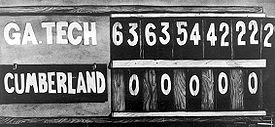1916 Cumberland vs. Georgia Tech football game
| Most lopsided game in college football history | |||||||||||||||||||
|---|---|---|---|---|---|---|---|---|---|---|---|---|---|---|---|---|---|---|---|
 |
|||||||||||||||||||
|
|||||||||||||||||||
|
|||||||||||||||||||
| Date | October 7, 1916 | ||||||||||||||||||
| Season | 1916 | ||||||||||||||||||
| Stadium | Grant Field | ||||||||||||||||||
| Location | Atlanta, Georgia | ||||||||||||||||||
The 1916 Cumberland vs. Georgia Tech football game was the most lopsided in the history of college football, with Georgia Tech winning 222–0. The game was played on October 7, 1916, between the Georgia Tech Engineers and Cumberland College Bulldogs at Grant Field (now a part of Bobby Dodd Stadium) in Atlanta, Georgia.
With Cumberland opting to punt on multiple possessions, the infamous score can be partially attributed to 97% of the game's plays occurring in Cumberland territory, with 64 of those plays occurring in Cumberland's own red zone.
Cumberland College, a Presbyterian school in Lebanon, Tennessee, had discontinued its football program before the season but was not allowed to cancel its game against the Engineers. The fact that Cumberland's baseball team had crushed Georgia Tech earlier that year 22–0 (amidst allegations that Cumberland used professionals as ringers) probably accounted for Georgia Tech coach John Heisman's running up the score on the Bulldogs, Heisman also being the Engineers' baseball coach. He insisted on the schools' scheduling agreement, which required Cumberland to pay $3,000 ($66,000 in inflation-adjusted terms) to Tech if its football team failed to show. In fact, Heisman actually paid Cumberland $500 ($11,000 in inflation-adjusted terms) as an incentive to play the game; his letter to Cumberland's athletic department read in part:
I hearby offer you the sum of $500 and an all-expenses-paid trip to Atlanta for your football team on the condition that you honor your contract by participating in and completing the Cumberland-Georgia Tech football game ... However, if this offer is refused ... I shall be forced to demand that your school reimburse the Tech Athletic Dept. in the amount of $3,000 for losses from the projected net gate receipts ...
...
Wikipedia
